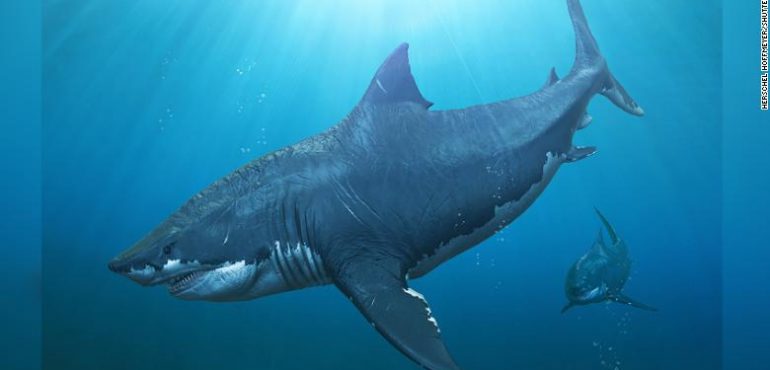The megalodon -- also known as the biggest shark ever -- became extinct a million years earlier than previously thought, due to competition from much smaller great white sharks, according to new research. The full paper is published in the Journal of Life and Environmental Sciences.
A team of scientists claim that the giant prehistoric predator, as seen in countless documentaries and movies such as "The Meg," starring Jason Statham, died out 3.6 million years ago, rather than 2.6 million years ago.
Earlier research relied on global fossil samples and one study linked their extinction to a supernova which was thought to have unleashed cosmic radiation that caused increased cancer rates among large animals.
However, researchers led by vertebrate paleontologist Robert Boessenecker with the College of Charleston, South Carolina, re-evaluated existing records and found a different pattern.
"We used the same worldwide dataset as earlier researchers but thoroughly vetted every fossil occurrence, and found that most of the dates had several problems -- fossils with dates too young or imprecise, fossils that have been misidentified, or old dates that have since been refined by improvements in geology," Boessenecker said in a statement.
To estimate the extinction date the team used the densely sampled rock record of California and Baja California, Mexico, and found that genuine fossil occurrences were present up until 3.6 million years ago.
This means that the megalodon extinction is not immediately related to the mass dying of seals, walruses, sea cows, porpoises, dolphins and whales around 1 to 2.5 million years ago, said Boessenecker. So this die-off may not have been a mass extinction caused by an event such as a supernova, as previous research has suggested.
Instead, the newly evolved great white shark, Carcharodon carcharias, likely played a role in the extinction of the megalodon, after great whites with serrated teeth spread from their initial home in the Pacific Ocean some 6 million years ago to seas around the world by 4 million years ago.
"We propose that this short overlap (3.6-4 million years ago) was sufficient time for great white sharks to spread worldwide and out compete (the) megalodon throughout its range, driving it to extinction -- rather than radiation from outer space," Boessenecker said in the statement.
Great white sharks are known as fearsome apex predators today but megalodons could reach up to three times the size of the largest great white ever recorded.
It might seem strange that the smaller shark could out compete the much bigger fish, but other experts support the assertion.
Emma Bernard, curator of fossil fish at the Natural History Museum in London, said that the study is a major step forward in improving our understanding of the extinction of one of the largest sharks ever to have swum the oceans.
"The cause of this extinction is still hotly debated, but a broad consensus is that competition with other large apex predators such as killer whales and the great white shark could be an important factor," Bernard told CNN via email. "This study uses the best quality data available to challenge an old hypothesis on a beloved favorite. It highlights the pivotal role museum collections play and the importance of accurate and detailed recording whilst collecting fossils."
Source: CNN, Full Article






